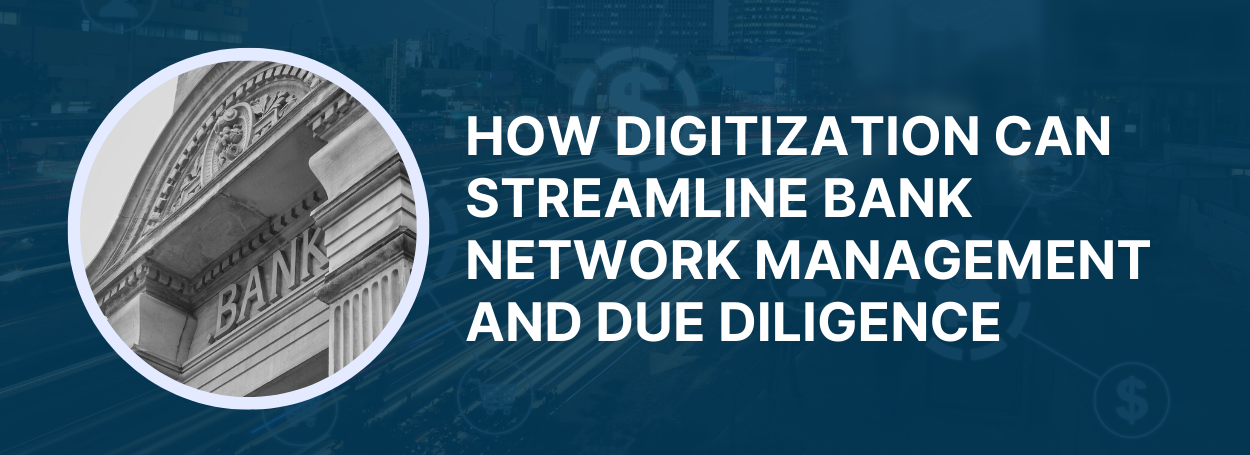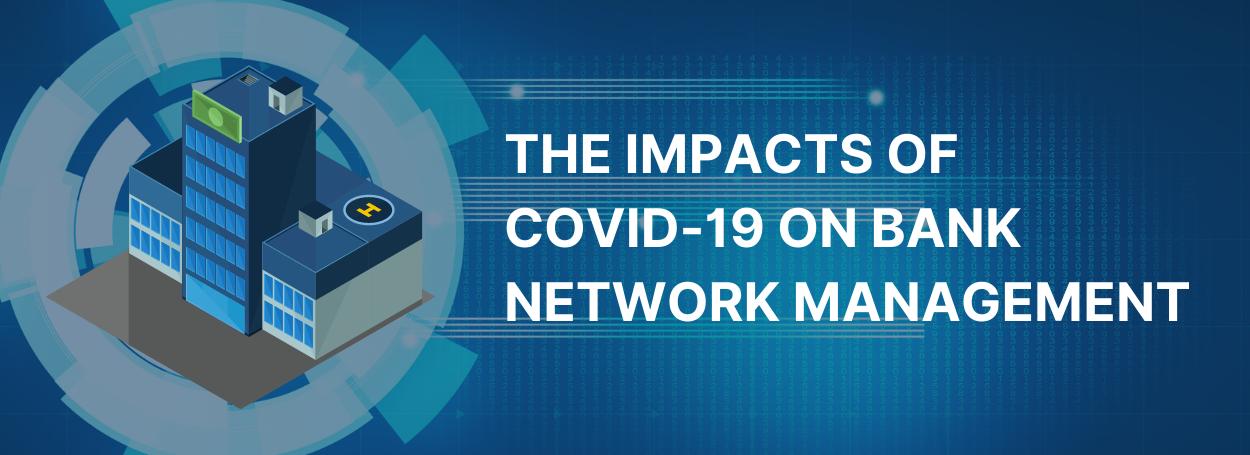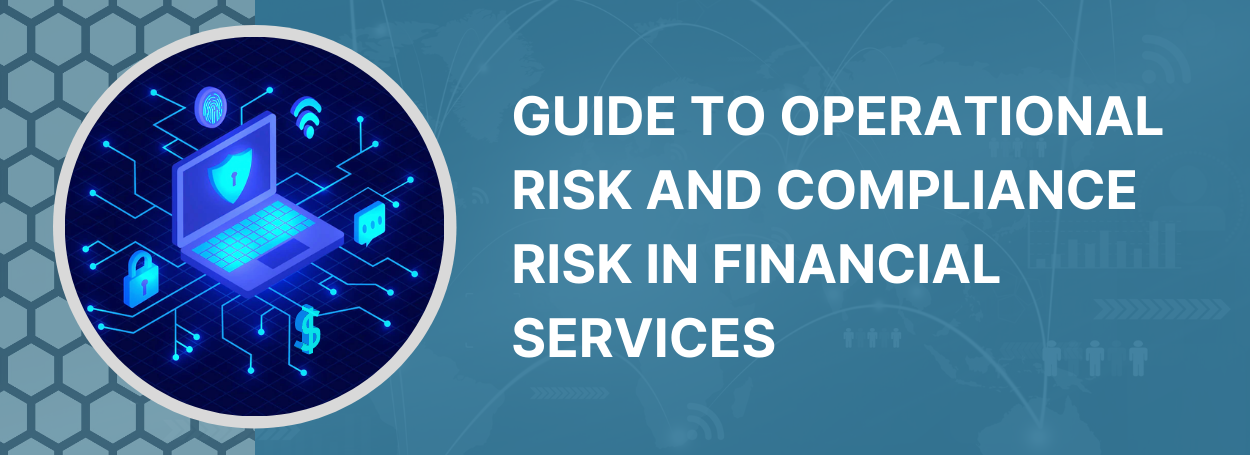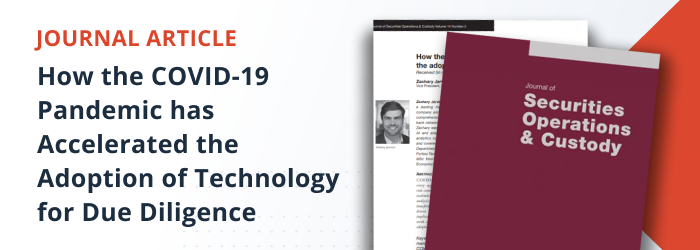How Digitization Can Streamline Bank Network Management and Due Diligence

In the past, network managers at global custodians, broker-dealers, and financial market infrastructures (FMIs) were primarily focused on oversight and client asset protection.
But the COVID-19 pandemic has created new challenges around operational resiliency, real-time risk monitoring, maintaining a “business as usual” operating environment, and due diligence.
In addition to dealing with these challenges, network managers also have to work with new accounts and providers. All these developments have transformed their roles, particularly around due diligence and risk management.
To successfully adapt to the new world, network managers need digital tools to monitor network relationships, control emerging risks, and streamline paper-based due diligence processes.
These tools can reduce the manual effort involved in due diligence, save time, improve operational efficiencies, and strengthen risk management.
One such tool is BNM360, an automated BNM platform from CENTRL.
Network Management and Due Diligence Before COVID
Network managers rely mainly on on-site custodian visits to perform due diligence.
This typically involves meeting with personnel from different functions, including operations, business continuity, anti-money laundering, and legal to review their procedures and verify what they said in the AFME (Association for Financial Markets in Europe) questionnaire.
In the pre-COVID area, most of the processes that support these activities were manual and supported by non-standardized documentation.
Management involved lengthy questionnaires with dozens or even hundreds of questions, lots of supporting documents on portals, or various formats, and multiple back-and-forth communications between DDQ senders and recipients.
For all these reasons, the due diligence process was arduous, time-consuming, and painful.
In the post-COVID era, there is a greater need to automate and streamline due diligence for all stakeholders. And for this, digitization and BNM platforms are vital.
Challenges to Network Management and Due Diligence in the Post-COVID World
COVID-19 has unleashed a new wave of disruption in the financial services industry, which has forced network managers to adapt.
While onsite visits must continue as a form of validation, there are many other ODD processes that should be digitized to improve competitive advantage.
Additionally, the pandemic has changed the way due diligence questionnaires (DDQ) are compiled. For example, the new AFME DDQ goes into granular details about business continuity planning (BCP) and disaster recovery.
In the coming years, DDQs will also need to address the procedures and processes at institutions related to remote working readiness, cybersecurity, and third-party risk monitoring.
All in all, the uncertainties created by COVID-19 have all transformed the network management due diligence process.
The Future of Due Diligence in Network Management
The number of onsite due diligence visits is unlikely to increase anytime soon, so network managers need better tools to digitize the process, and maintain its efficiency and effectiveness.
In 2021 and beyond, margin shrinkage, a drop in assets under custody, and prolonged low interest rates will continue to affect the financial services industry.
These developments could necessitate cost-cutting measures, which will require further streamlining of the due diligence review process. Moreover, if these cost pressures continue, even more network managers will rely on virtual due diligence.
Even if onsite due diligence visits do make a comeback, their frequency will remain muted. Instead, digital due diligence will help create a new “hybrid” model. And this “new normal” will be facilitated by digitization tools and BNM platforms.
To support real-time risk monitoring, artificial intelligence (AI), data analytics, blockchain and of course, global BNM platforms like BNM360 will be very valuable.
The Benefits of Digitizing Due Diligence Processes
In financial services, due diligence must be done accurately and efficiently. However, many network managers still rely on inefficient workflows, manage complex DDQs, and are forever stuck in an “email and excel hell” for information and updates.
The use of manual or ad hoc methods makes the process painful for both senders and recipients.
To eliminate these issues, automating due diligence processes is critical. With an automated and integrated platform like BNM360, DDQ recipients can easily respond to and manage their side of the request.
Senders can track progress, and easily get clarification about specific answers or follow-ups in applications.
Further, digitizing DDQs and document request checklists can eliminate multiple emails, promote accountability, and automate risk scoring. All of this will streamline due diligence workflows, generate more impartial analysis, and also yield more insightful outcomes.
Automating DDQs increases the efficiency, and reduces the subjectivity of the network management process. Network managers can start with AFME or Wolfsberg templates, and then build upon them with individual proprietary questionnaires. They can also:
- Auto-assign questions and sections for evaluations
- Pre-populate answers from previous cycles
- Customize the scoring framework
- Auto-score yes / no and multiple choice answers
- Schedule upcoming and recurring DDQs
- Automatically extract data from DDQs to produce insightful and actionable reports
Network managers can also turn DDQs into metadata, create a data repository, and reuse this data for future due diligence evaluations. Any new changes in responses will automatically reflect in the repository to further simplify due diligence.
All these capabilities can save countless hours during due diligence, and make life easier for network managers.
The Impact of Cybersecurity on Digitalization in Network Management and Due Diligence
Financial institutions now deal with many serious cybersecurity challenges. Many custodians and FMIs host and manage sensitive data, and there has been an increased surge of cyberattack activity following COVID-19.
For these reasons, effective cybersecurity has become one of the top priorities for network managers.
As a result, they must scale up due diligence activities on their sub-custodians’ cybersecurity provisions. To this end, DDQs now include more questions around cybersecurity and data protection. This trend will continue in the future as well.
Digitization will also play a role in streamlining this aspect of due diligence. For instance, a centralized, digitized platform can create an appendix that allows recipients to complete the DDQ without having to send encrypted or proprietary data through email. Such older practices can risk their cybersecurity. Digitization removes this risk.
At the same time, the DDQ sender receives the information in the same centralized repository, so they no longer have to waste time on document formatting or response standardization. Instead, they can use the received information to streamline their due diligence evaluations.
Digitization with a centralized platform also makes it easier to assess and manage third-party risk. This allows network managers to move on from sub-optimal episodic monitoring of providers’ cyber hygiene posture to ongoing monitoring with real-time data. This capability is of immense value in network due diligence.
Furthermore, network managers now need to collect and manage DDQs and associated controls like BAML and KYC in real time. If done using manual processes, they can only do such collections on an annual or semi-annual basis.
But with digitized tools, any information received will be in real (or near real-time) to make it easier to assess any concerns about a particular provider. Multiple stakeholders can track these concerns and assess documents from one centralized location.
How BNM360 Addresses the Modern Challenges of Due Diligence
BNM360 automates the entire DDQ process to increase its effectiveness, save time for network managers, and provide actionable insights to those tasked with analyzing the data.
It also provides a powerful and intuitive module for agent banks to respond to DDQs, and effectively manage the process at their end.
Network managers can leverage BNM360 to automate risk monitoring and improve their oversight of agent banks. To automate and simplify DDQ, they can take advantage of numerous features, such as:
- A content library with standard AFME, Wolfsberg and other templates
- Configurable scoring frameworks
- Assessment bulk publishing
- Single repository with centralized evidence and documents
- Automated workflows to schedule DDQs by risk level
A fully automated end-to-end DDQ process benefits everyone, whether they are senders or recipients. BNM360 provides numerous features to realize these benefits.
The platform enables network managers to conduct due diligence effectively with a centralized agent bank database, document library, and 360 degree views.
It also supports remote communications and effective collaboration through:
- An auto-updated agent database
- Powerful search capabilities
- Detailed audit trails
- Email notifications and reminders
Network managers can also perform continuous monitoring and risk profiling. They can quickly identify and monitor changes, and continually view all compliance documents. It’s also easy to track risks, find DDQ gaps, and manage resolutions with BNM360.
And last but not least, detailed operational analytics, dashboards and reports are a critical component of BNM360, and its due diligence capabilities.
Network managers can view detailed analytics at the agent bank and portfolio level, track DDQ progress, run benchmarks across portfolios, and auto-generate DDQ summary reports.
Some of the world’s largest banks use BNM360 to transform their due diligence process, and achieve cost and efficiency savings of 70% or more.
To learn more, request a free demo of BNM360. Click here to get started.


